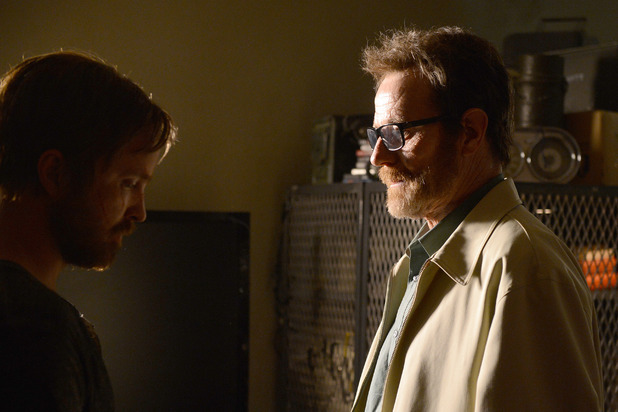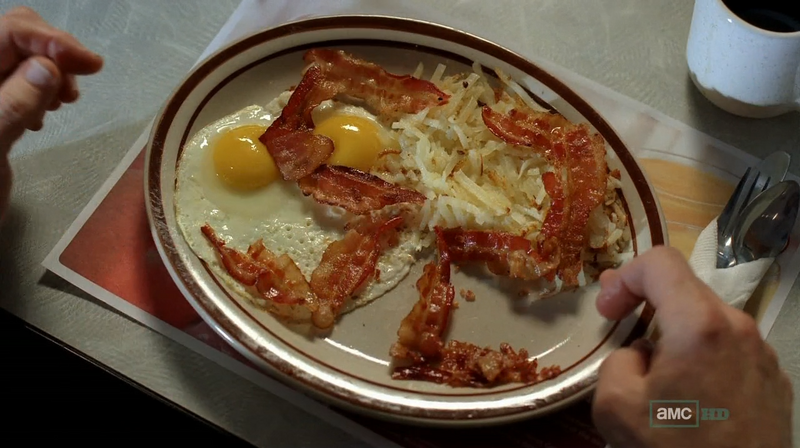Endless speculation on the final episodes of Breaking Bad, particularly "Felina," is simply addicting. And now, I'm going to add fuel to the fire with what might be the most ridiculous interpretation of what happened in the final episode and a half. I have to do this, I'm sorry. The idea popped in my head, it kept growing, and now it must come out. Basically what I'm trying to say... take this interpretation with a grain of salt.
Spoilers ahead, obviously.
Walter White died in New Hampshire. Ed (Robert Forster) drove him up to New Hampshire with a completely different identity and Walt stayed up there for god knows how long. Months. The nearest town was eight miles away. An eight mile walk can take up to, approximately three hours. In the snow? Perhaps much longer. Needless to say, it's quite the hike. A non-stop drive from northern New Hampshire to Albequerque, New Mexico would take upwards of 33 hours. Again, that's not including snow or traffic conditions. There's simply no way Walt could've driven to Albquerque without stopping a few times along the way. He had to get some sleep at some point. Where would he go? To a motel? Sleep in the car?
Point being, we don't see that in between part. We don't see how Walt escapes the police in New Hampshire. We don't see what his drive from NH to New Mexico is like. Obviously, Vince Gilligan wouldn't want to bore us with the details, but considering his emaciated, sickly condition, you would have to imagine that Walt's trip wouldn't be such smooth sailing. Ed told him, repeatedly, do not go out in public. You will get caught. Walt chooses to disobey. And, somehow, manages to never get caught in the process. Not during the trip to New Mexico, and not while he's in Alberquerque. Now, of course, Walt's look has changed quite a bit, but not that much. Shouldn't he have been recognized by an authority figure at least once? We'll get to that a little later...
Let's stay at the bar. The first thing Walt does when he gets to the bar is talk to Walt Jr. He tells Flynn that he has a package that he's going to send to him via Flynn's friend Louis. He's gonna send him a box with $100,000 inside. Walt Jr., as we all know, tells him to "just die already."
Walter White has already died though. And it is of my belief that none of the events, starting from the bar, actually took place. Obviously, Walter White would never want to die alone in a cabin in New Hampshire. So what does he do? He constructs this fantasy, this neatly-wrapped version of events with him as his alter-ego, Heisenberg. See, we all knew Walter White as this brilliant mastermind, a tactician, whose plans always have unintended consequences. That's what made the show so powerful and thrilling to watch. But of course, in Walt's ideal world, his Heisenberg character would be that same brilliant tactician, except everything would go according to plan with no repercussions.
Walt wanted to get back at the Nazis, he wanted to settle the score. He wanted to do it for himself. As Heisenberg, he is doing it all for himself. Why? Because it makes him feel good, it makes him feel alive. The only way that he can allow himself to go back to New Mexico and settle the score is to have the innate knowledge that he can't do it for his family. No. Instead, he's doing this for himself. He's doing it for his soul. And at that last moment, in the final scene of the show, when he's gazing up to the ceiling, having dropped to his death (a self-inflicted gunshot wound), finally his soul is able to leave his body and make peace. He gets to die the way he wants to die, being able to own that Heisenberg legacy. But Heisenberg cannot be real. There is no Heisenberg. There never was. "Heisenberg" is a myth Walter White created, and in his mind, as he lays dying, he's able to live out this glorified fantasy before his soul can officially leave earth.
After he got off the phone with Walt Jr. in the bar, Walt calls the DEA. Then Walt sits at the bar, ordering a drink, watching TV when it just so happens that Elliott and Gretchen Schwartz are on Charlie Rose. We haven't see these characters for quite some time. Yet, here they are, talking to Charlie Rose. The very moment Walter asks the bartender to leave it on, Rose is in mid-conversation with the Schwartzes about Walter White. Walter White/Heisenberg uses the Schwartzes as a tool in which he can finally give Walt Jr., and the rest of his family, his money. The Schwartzes were literally the only option he had left and they just so happened to have appeared on Charlie Rose, the exact moment after Walter White had that conversation with Walt Jr. and tipped the DEA to his location. Convenient? Yes, very much so, indeed.
Skip to New Mexico, as Vince Gilligan does. Walter White is somehow able to pose as a reporter, getting the New York Times on the phone, tracking down the Schwartzes. When Elliott and Gretchen arrive at their place, Walt is already there. Their house is typically gorgeous. "Nice place you have here." This mansion could represent the kind of place Walter White envisions the Schwartzes would be living in. Isn't it a little weird that they live at this new place? Does it really exist or is it Walt's fantasized construction of where the Schwartzes would be living?
But, moreover, the biggest thing we all have a tough time getting over is how Walt is able to already be in these places, going unnoticed. Whether it'd be at the Schwartzes, Skyler's place, or the cafe where Lydia and Todd meet. Walt's already there, like a ghost. And each time, he's able to coldly confront them as Heisenberg. He's able to win one over with the Schwartzes, he's able to make amends with Skyler, and he finally has a reason to use his ricin. Everything goes exactly according to plan, the exact way Heisenberg imagines it.
By the time we reach the compound where the neo-Nazis are, Heisenberg has constructed an elaborate machine gun apparatus inside the trunk of his car. He strategically parks his car where he will use this device. He manages to get all the members of the gang within aim of machine gun. He manipulates them into bringing Jesse out. He dives at Jesse, the machine gun goes off, and Heisenberg manages to protect his surrogate son whilst killing all of the gang members and, eventually, himself. He's a hero. Jesse's able to have his revenge on Todd, and when it's time to settle the score with Walt, he ultimately decides not to kill him. Even though, Walt gives him the opportunity to do so. In Heisenberg's world, he's able to settle things with his family and with his partner Jesse. Some people have commented that Walt dying by his own bullet was the one flaw in his plan, I disagree. What better way for him to die than to be saving Jesse whilst dying? He's able to save his partner, someone he really did care about. He treated him like such shit and yet, here he is, saving the man's life. Sacrificing himself for his surrogate son. He's able to live just long enough to watch him ride off, alive and well, while being able to die in a meth lab, where his legacy will forever live on. Convenient? Oh yes. You're goddamn right.
"Felina" isn't really just about redemption, it's about the culmination of the evolution of Walter White. For 62 episodes, we've watched him go from the meek Chemistry teacher to the "brilliant mastermind" that is Heisenberg. "Felina" is the end of his transformation, it's who he was supposed to become all this time. Is it completely fantastical? Yes, yes it is. Because, in reality, Heisenberg could never actually exist. Even the Gus Frings of the world couldn't be as elusive as this Heisenberg character, and Gus Fring took down an entire Mexican cartel. I think this episode was a complete fantasy, and it starts in the previous episode with Walter in the bar. This transformation needed to happen. The real, true story ends with Walter decaying in a New Hampshire cabin. The final episode and a half is Walter White/Heisenberg being able to completely absolve himself so his soul can finally rest easy. This show was always about Walter White, it was always about the transformation. It needed to happen. He needed to go out this way. He needed to own up to this mythical figure he so desperately wanted to become. By the end his name is all he had left.
Walter's fantasy isn't the only thing that occurs during "Felina." In the episode, we see Jesse Pinkman at peace, woodworking, only to be woken up to a cold reality: him being trapped, forced to cook meth as a slave. For Walter? We already know his cold reality: it's him being trapped in New Hampshire, forced to have his cancer wither him away. The rest of the episode is Walter's fantasy.
And that's my ridiculous interpretation of "Felina," the final episode of Breaking Bad. I can enjoy "Felina" at face value, I thought it was a great conclusion to an amazing series. But I have a sneaking suspicion that all those elements in the episode that felt "convenient" were by design. Ultimately, I think the final episode is Walter White in pure fantasy mode. I don't think he ever truly got his comeuppance. I don't think Vince Gilligan would be so careless. The entire episode has a weird dreamlike feeling to it. Even those flash forward teasers we saw in the other season 5 episodes felt off from "the reality"of the show. I don't think they were ever real. I think they're all in the mind of Walter White.
Feel free to completely tear down this interpretation below. Thanks for reading.




3 comments:
Fantastic stuff. Well written and intriguing. Colromcolumn.
Thanks for writing this and providing another intriguing angle from which to view the final season. Cheers!
Thanks guys!
Post a Comment